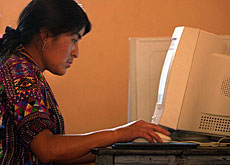Leuenberger wants global tax on “information”

Communications Minister Moritz Leuenberger has called for a global tax on information to help bridge the digital divide.
Leuenberger said the levy would serve to finance new information and communication technologies in regions where people have little or no access to the internet.
Non-governmental organisations have welcomed the move, which they say caught them by surprise, describing it as a “necessary step in the right direction”.
The Swiss communications minister unveiled his proposal at the opening of a United Nations meeting in Geneva charged with following up the World Summit on the Information Society (WSIS), held jointly in Geneva and Tunis.
Leuenberger even went as far as to state that bridging the digital divide was as important a challenge as tackling climate change.
“Today more than half the world’s population don’t even have a telephone,” he said. “And four out of five people don’t have access to the internet. They are cut off from information and any possibility of exchanging information, training or improving themselves.”
“If we don’t want these people to leave their countries, we must do something to ensure that the gap doesn’t grow wider between those who surf the internet via high-speed ADSL and those who have to walk ten kilometres to the nearest phone box.”
Leuenberger, who appealed for an international tax on carbon dioxide at last year’s UN Climate Conference in Nairobi to fund the fight against global warming, believes a similar levy on information would help the WSIS achieve its goals.
Such a tax would be raised, for example, on paid-for information and computers. Leuenberger stressed that low-cost providers would be exempt.
Information superhighway
Leuenberger’s chief spokesman André Simonazzi told swissinfo that the money would be used to finance internet development and build educational content in countries that had yet to travel far along the information superhighway.
He added that it was the first time Leuenberger had publicly expressed the idea, and details of how and on what a tax would be imposed had yet to be thrashed out.
“Now we need to see whether this idea can be developed and whether it is realistic,” Simonazzi said. “We also need to see whether other countries will pick it up.”
Wolf Ludwig, co-president of communica-ch, the Swiss Platform on the Information Society, said he was taken aback by the news “because Leuenberger is arguing in our direction”.
Ludwig, whose civil society coalition comprises 25 member organisations, said the idea of a flat rate had been mooted by communica-ch a couple of years ago. One idea, he said, would be to apply a minimal rate to emails.
“Three years ago the government was very hesitant in this domain but what Leuenberger is suggesting could really help,” said Ludwig. “Hopefully it will be taken seriously.”
swissinfo, Adam Beaumont in Geneva
The UN decided to hold the World Summit on the Information Society (WSIS) in two phases.
The first part took place in December 2003 in Geneva, where an action plan was endorsed by 175 nations to bridge the digital divide.
The second part was held in Tunis in November 2005.
The tenth session of the UN Commission on Science & Technology for Development takes place in Geneva from May 21-25.
It is focusing on the follow-up to the outcome of the World Summit on the Information Society at the regional and international level, to identify achievements, gaps and challenges, as well as future action needed to further implementation.

In compliance with the JTI standards
More: SWI swissinfo.ch certified by the Journalism Trust Initiative










You can find an overview of ongoing debates with our journalists here . Please join us!
If you want to start a conversation about a topic raised in this article or want to report factual errors, email us at english@swissinfo.ch.